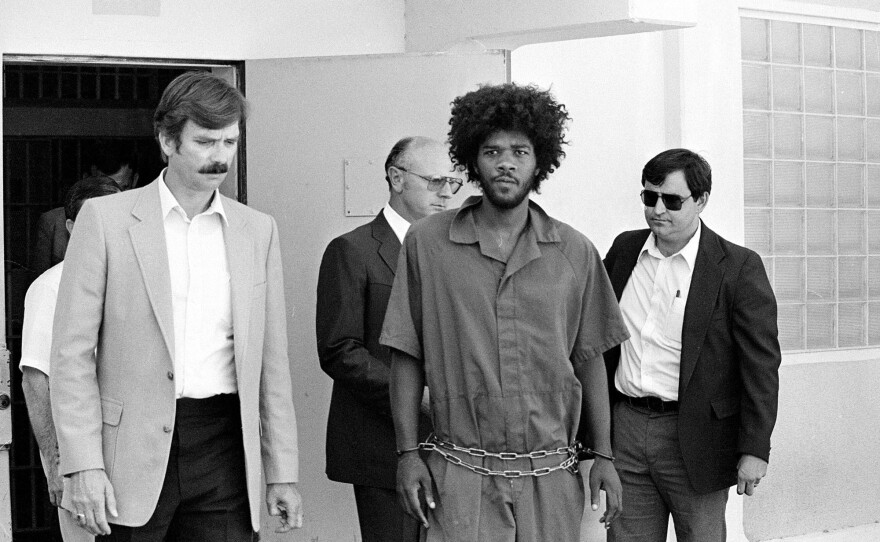>>> An extraordinary op-ed in the New York Times over the weekend explored the case of Kevin Cooper a convicted murderer on California's death row. The column was extraordinary for its length, elaborate graphics element, most especially for its content. It accuses San Bernardino law enforcement of framing Cooper who is black for the murder of a white family more than 30 years ago. It urges Governor Jerry Brown to allow advanced DNA testing of the evidence remaining from the crime. Joining me is New York Times columnist Nicholas Kristof. This was a sensational crime back in 1983. Who were the victims and how were they killed? >> It was the Ryan family. The couple Doug and Peggy Ryan. And their two children age 10 and eight were attacked along with a visiting 11-year-old boy on a sleepover. Their son did survive. The parents and the daughter and the neighbor were killed. They were stabbed to death with multiple weapons. There were three or four weapons. That was one of many indications that suggested to the corner originally that this was not one intruder who had done it at several attackers. >>> How did Kevin Cooper become a suspect? >> Originally, the authorities were on the lookout for three white men. That was partly because the lone survivor had said that there were three white men responsible. Then very quickly the authorities realized that a young black man with a long criminal record imprisoned for Berkeley nearby at Chino prison had escaped. And had held up in a home almost right next-door to the house where this murder had taken place. Quite understandably, they strip -- switch their focus to him. They stopped looking at anything else. They were sure he did it. And I think they were frustrated by the fact they could not find fingerprints, hairs, fibers, evidence at the crime scene linking him to it. That is when evidence began to adhere in very suspicious ways. My own belief is that they probably were planting evidence in the belief that they were helping put away a really evil murderer. Once they were down that road, they could not adjust when the growing amount of evidence began to point instead to a white man. A white individual whose girlfriend had turned to man. >>> You spoke with the man that some believe was one of the men who actually committed one of the murders. >> We communicated. He was not happy to hear from me. He did not want to talk about it or go into details. This is a man who was a convicted murderer. He had served his term and release from prison less than a year before the Ryan murders.'s girlfriend turned him in because he had arrived home late on the night of the murders in a vehicle that resembled the station wagon stolen from the Ryan's. In bloody coveralls that he then left at this house and absent a tan T-shirt that resembled a tan T-shirt that was worn by one of the murders and left by the scene. This girlfriend handed over the bloody coveralls to the police thinking that they would be tested to see if that was the Ryan's blood on them. Instead, the police threw away the coveralls. They focused just on Kevin Cooper. >>> You write in this op-ed that you don't know for sure that Kevin Cooper did not commit this crime. Are there elements of his story that make you unsure? >> If I had been on the jury at that time, I think I probably would have voted to believe the sheriff deputies. Over time, almost all of the evidence has been discredited. A lot more evidence has been developed. I think one of the lessons from death penalty cases over the years as we should have humility about we can know and how sure we should be. I believe Kevin Cooper is innocent. I am not absolutely positive. The way to resolve this doubt is not to execute someone, it is to allowed advanced DNA testing. What I found frustrating is in California, not Alabama or Texas but California, Governor Jerry Brown has refused to allow advanced DNA testing, touch DNA testing of this T-shirt worn either murder of hairs that were found in the victims hands which by the way were blonde or brown hairs they did not belong to an African-American like Kevin Cooper and the hatchet. If there is doubt, let's use science to help resolve this doubt. Let's not keep somebody on death row without allowing him a defense at their own expense to do this kind of testing. >>> One of the things I wanted to mention was Kamala Harris Senator when she was Attorney General and Jerry Brown turned down the request for the advanced DNA testing. What is being said now? >> My colleague criticized Harris on that basis. Friday she called me up and said she felt terrible about this. She then shortly issued a statement indeed calling on California and Governor Brown to allow the advanced DNA testing. So I hope Governor Brown is listening. >>> In your article, you touched on a broader critique of the American legal system. You write this was a failure at every level and it should prompt reflection not just about one man on death row, but also about profound inequities in our entire system of justice. What do you mean by a failure at every level? >> This is an unusual case in the fact that you have for law school deans who have spoken up for Kevin Cooper, you had five federal judges who have said he was framed, that there has been quite a lot of attention on this. This kind of situation where you have a sensational murder, where the police are under tremendous pressure to solve it, and when they quickly find someone they think fits the bill and then evidence begins to appear in suspicious ways. I think that happens much more than we would like to think, especially, when the person targeted is a person of color or somebody limited names who cannot afford a first rate lawyer. If Kevin Cooper had a great lawyer at trial, this would not have happened, he would not be on death row he would've been acquitted at the original trial. One juror said if there had been just one less piece of evidence, he would've been acquitted. It took them a week to convict him. I think there is a failure the legal system. There is a failure in the appeals process. A failure of politicians who refuse to allow the advanced DNA testing. I'm afraid, it is a window into broader weaknesses into our justice system. >>> Both the length and the look of this particular column is extraordinary. I am so glad we were able to speak with you. I have been speaking with New York Times columnist Nicholas Kristof. Thank you, Nicholas. >> Thank you, Maureen, I appreciate it.
California's governor should allow more sensitive DNA testing that advocates say could exonerate a death row inmate, U.S. Senator Kamala Harris said Friday.
"As a firm believer in DNA testing, I hope the governor and the state will allow for such testing in the case of Kevin Cooper," Harris, a former state attorney general and San Francisco prosecutor who opposes the death penalty, said in a statement .
Cooper, 60, is awaiting execution for the 1983 Chino Hills hatchet and knife killings of four people. He escaped from a nearby minimum-security prison east of Los Angeles two days before the slayings of Doug and Peggy Ryen, their 10-year-old daughter Jessica and 11-year-old neighbor Christopher Hughes.
Two previous DNA tests concluded Cooper was the killer. A piece by New York Times' columnist Nicholas Kristof suggesting Cooper was framed sparked Harris's comments. Kristof's column labels Harris one of the "flawed political leaders" he blames for blocking the new DNA testing while she was attorney general.
A San Diego judge in 2011 blocked Cooper's request for a third round of DNA testing. Cooper says he was framed and that more sensitive DNA tests on items including a T-shirt and a speck of blood on a paint chip would prove his innocence. But the judge ruled he failed to show why more DNA tests are needed.
Cooper's request for clemency is under review by Gov. Jerry Brown's office, said spokesman Evan Westrup. Those requests "are thoroughly and diligently reviewed" and will determine the next step, he said.
California hasn't executed anyone since 2006.
The only survivor — the Ryens' grievously wounded 8-year-old son — said three white intruders committed the crimes, Kristof wrote, while a woman told police that her white convicted murderer boyfriend was probably involved and turned over his bloody coveralls. Kristof says investigators destroyed the coveralls and arrested Cooper, a young black man, even though blond or brown hairs were found in the victims' hands.
Cooper's defense says it would pay for the new DNA testing.






